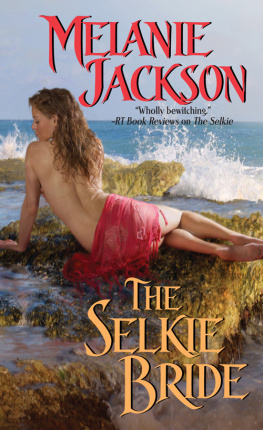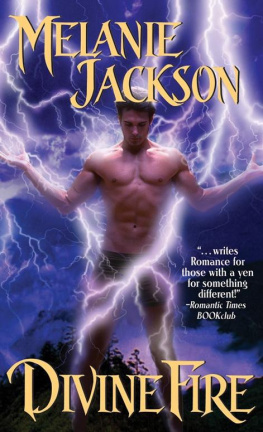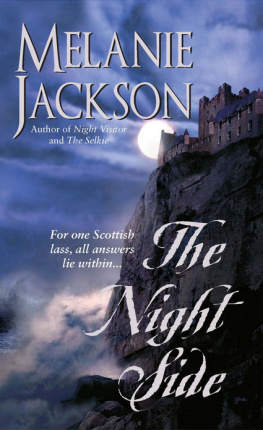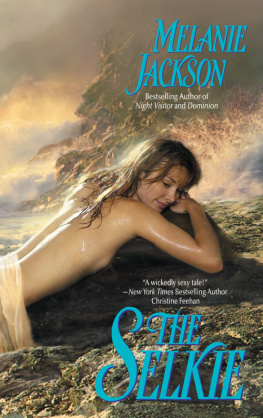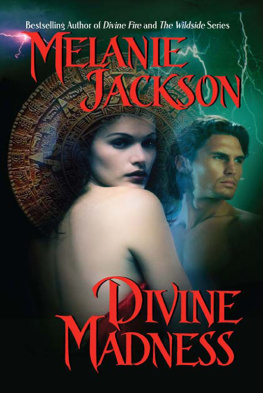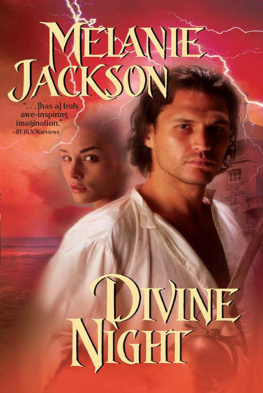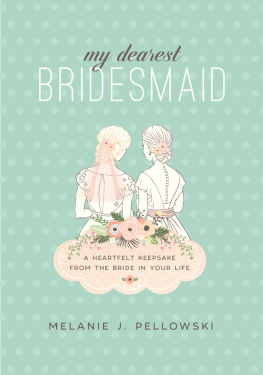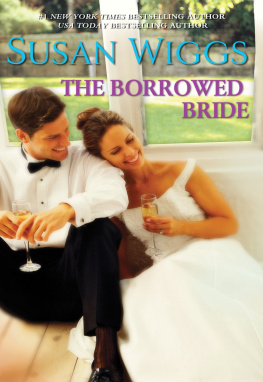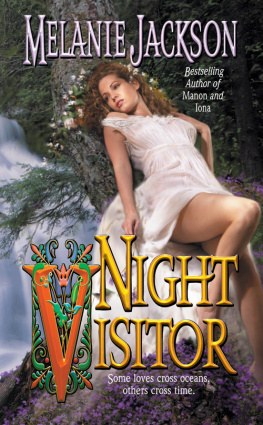Melanie Jackson - The Selkie Bride
Here you can read online Melanie Jackson - The Selkie Bride full text of the book (entire story) in english for free. Download pdf and epub, get meaning, cover and reviews about this ebook. year: 2010, publisher: Love Spell, genre: Science fiction. Description of the work, (preface) as well as reviews are available. Best literature library LitArk.com created for fans of good reading and offers a wide selection of genres:
Romance novel
Science fiction
Adventure
Detective
Science
History
Home and family
Prose
Art
Politics
Computer
Non-fiction
Religion
Business
Children
Humor
Choose a favorite category and find really read worthwhile books. Enjoy immersion in the world of imagination, feel the emotions of the characters or learn something new for yourself, make an fascinating discovery.
- Book:The Selkie Bride
- Author:
- Publisher:Love Spell
- Genre:
- Year:2010
- Rating:5 / 5
- Favourites:Add to favourites
- Your mark:
- 100
- 1
- 2
- 3
- 4
- 5
The Selkie Bride: summary, description and annotation
We offer to read an annotation, description, summary or preface (depends on what the author of the book "The Selkie Bride" wrote himself). If you haven't found the necessary information about the book — write in the comments, we will try to find it.
The Selkie Bride — read online for free the complete book (whole text) full work
Below is the text of the book, divided by pages. System saving the place of the last page read, allows you to conveniently read the book "The Selkie Bride" online for free, without having to search again every time where you left off. Put a bookmark, and you can go to the page where you finished reading at any time.
Font size:
Interval:
Bookmark:

Thunder crashed outside. The rain had grown ferocious while I read, and the wind all but screamed. It was a fit night out for neither man nor beast, so nothing could have surprised me more than to have my late reading interrupted by a pounding on the ancient cottage door. The blows were heavy and spaced evenly, like the tolling of a funeral bell. This was the sound of doom calling, and it demanded I answer.
I had a welcoming if insincere smile pasted in place when I pulled back the heavy bar and opened the door, but it faded quickly as I surveyed the creature on my doorstep. He was maleoh, definitely maleand quite the most beautiful being I had ever seen. But there was also something about him that seemed sinister and made me feel weak and insignificant as I stood before him. Perhaps it was the fierce black eyes or the alabaster skin, or the long hair that fell in a sleek cascade to below his shoulders. Or perhaps, most alarming of all, it was how not a drop of rain seemed to cling to himnot to his hair, not to his skin, not to his old fashioned sark and kilt.
For Auntie Nell and Uncle Ernie and all the happy childhood memories they gave me.
By all accounts my great-aunt, Megan Culbin, was always an eccentric woman. I never met her, so I can offer no firsthand impressions of the soundness of her mind. Certainly she had no high regard for my grandmother (an opinion for which I forgive her, since I also had no great liking for the woman; sorry, Mom). As for the truth of this narrative, I must confess to having some doubt. I am, in fact, all doubt. The story is a compelling one, though, so fictitious or not I present it here with only marginal editing and compiling and leave readers to decide what is or is not true, and whether Megan Culbin was deliberately misleading or simply insane.
The following collection of documents was purportedly received by Mr. Alexander Waverly of the firm of Waverly and Woolencott of Edinburgh in December of 1923. The solicitor claimed it came with an attached affidavit that it is in my aunts hand. Mr. Waverlys grandson forwarded it to me on his death because I am my aunts only living female relative, and it took some decades to find me. Since there is no other money or property involved, I suspect the firm has been less than diligent in seeking me out and Mr. Waverly may have felt that he was protecting my aunts reputation.
I present the whole collection now with no further comment.
Melanie Jackson
An American Womans Adventure in Scotland by Megan Culbin
Memory is faulty on its own, and mine has been interfered with to some degree, but I have rendered this account of the events of fall 1923 as honestly and accurately as possible. Any omissions are not intentional. Believe or dont, but Ive done all I can to make a record of my actions before I leave Findloss forever. Enclosed is a copy of my will, drawn in my own hand but not witnessed. We shall not meet again.
Many thanks, and all best wishes.
Megan Culbin
From the journal of Megan Culbin
Somewhere in the Atlantic, aboard the good ship
Morgana
July 2, 1923
Where do dreams go when they die? In my case, they are headed for Scotland and I have high hopes of giving the nightmares a decent burial there. Maybe then the dead will rest in peace and I will live in the same.
To begin with, you must know that I did not love my husband. I hadnt much liked Duncan when he was alivenot once we married and he revealed himself fully for the crazed fiend he wasand I liked him only slightly better once he was dead and buried as far underground as the sexton could decently place him. The man made my life a bewildering nightmare of humiliation from the time we were married, but he did do one thing for which I was grateful: He actually got around to making a will in my favor before surrendering himself to complete drunkenness and debauchery. So, along with inheriting all his debts to angry tradesmen, I also gained title to his late Uncle Fergus Culbins cottage in Scotland, the mysterious and unmentioned old man having the consideration and forethought to die the week before my husband overdosed on absinthe and a seven-percent solution of cocaine while visiting a prostitute.
Thus I am on my way to Scotland, a widow of extremely modest means, and no kin to turn to except a puritanical aunt and uncle in Charleston and perhaps some distant relations of my late husband, who would doubtless prefer not to know me. My prospects are bleak enough, but I still count myself as the most fortunate of women. After all, I have escaped the worst possible marriage and will yet have a roof, however modest, over my head this winter. I am young and able-bodied. Whatever may yet come, not all widowsor wivesare so lucky.
Moan ye winds that never sleep, Howlye spirits of the deep
The Maiden of Morven
October 31, 1923
Did nowt scare you yonder noo? a gruff voice asked, around the stump of a long pipe held clenched in yellowing teeth that I could see even at a distance.
Weel, tis a feart place but I feel nae venom here. Nae ghosts. And still I heard the younger of the fishermen answer slowly.
It was a trick of the shifting wind that parts of their conversation would occasionally be blown to where I was sitting some yards away with my sketchbook, half hidden by the swaying marron grass. I was resting on what used to be the banks of an old river, whose course was marked by a thin line of aquatic grasses and gaunt, distorted trees where noisy bitterns lived. The water began at what once was Loch Findloss, a winter lake that dried up almost every summer but returned again in fall. Its course now remains forever dry, surrounded by the remains of a wildwood that was prostrated by the wind during a horrific tempest and then fossilized in its surrendered posture. The village is likewise frozen. It has been this way since the Storm.
Naeone ever carried the deid away for burial. They are either beneath the sand or taken by the sea. Either way, I doubt they rest easy here.
The older fisherman spat and quickly looked about him. The nineteenth century lingers here, and the local custom is to never speak of those lost to the Storm if a bird or seal is near, lest they carry word back to the ocean and summon something unholy. He was safe that day; it was only me, the silent American, and a few fat hares eavesdropping on the conversation.
The fishermans opinion was a popular one, but I sincerely hoped that he was wrong about the ghosts, because this was now where I lived: Findloss, the cursed village. What I didnt need were thoughts of the restless dead struggling out of the sand to keep me up nights; the restive winds and often nervous living were quite trial enough now that days were growing short and cold and the tide called uproariously night and day, temporarily thwarted from taking back the earth that had thrust itself out of the oceans, but never giving up entirely.
Be it ever so humble, I muttered, shaking sand from my skirts, an action that had grown so customary, I rarely marked it. The dunes around me were constantly shifting, and if one sat still for too long when the breeze was blowing the sand would bury one. All towns have their quirks and charms; ours was an ever-changing landscapethough I have to admit that our whispering dunes possessed none of the appeal of the more famous singing sands of Eigg, and were in fact a great deal more sinister.
Findloss was and is a fishing village, granted official charter in 1411, though people lived here long before that in crude, windowless huts, and perhaps in caves before that. This is a fact listed in many books and also proved by the tax rolls the solicitor showed me while trying to dissuade me from moving here. It is also a well-documented reality that the village disappeared one Beltane night in 1845, buried under thirty feet of storm-driven sand, and for fifty years no taxes were collected because the village was missing. The rest of the stories about what happened hereand why, and caused by whomare both conjecture and a source of endless discussion by the local fishermen and their brave spouses, the few souls who have reluctantly repopulated the area.
Font size:
Interval:
Bookmark:
Similar books «The Selkie Bride»
Look at similar books to The Selkie Bride. We have selected literature similar in name and meaning in the hope of providing readers with more options to find new, interesting, not yet read works.
Discussion, reviews of the book The Selkie Bride and just readers' own opinions. Leave your comments, write what you think about the work, its meaning or the main characters. Specify what exactly you liked and what you didn't like, and why you think so.

